11 Best Whiteboard Software for Collaboration in 2026
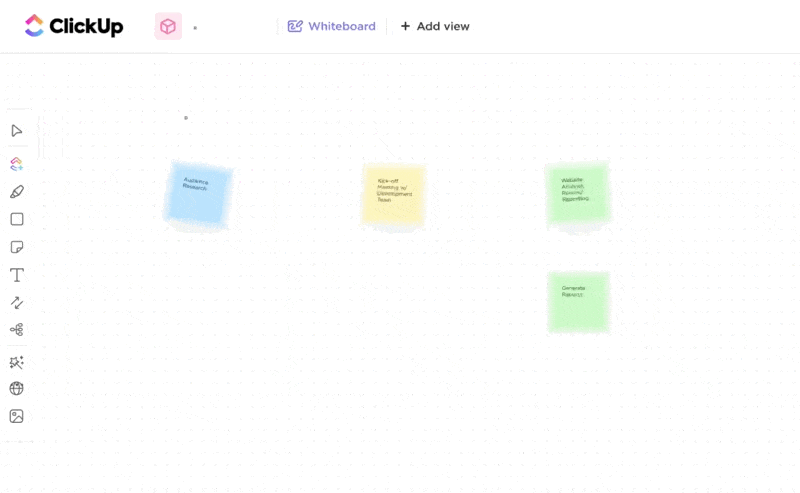
Sorry, there were no results found for “”
Sorry, there were no results found for “”
Sorry, there were no results found for “”

From classrooms to boardrooms, creativity flows best when ideas have room to breathe. But let’s face it—physical whiteboards are a bit… limited. Erased too soon, overcrowded with scribbles, and forget about remote teams joining the fun.
Enter digital whiteboard software, the superhero of brainstorming, planning, and teaching—minus the mess!
With endless space, real-time collaboration, and all the tools you need to bring your ideas to life, it’s no wonder more educators, teams, and creatives are switching to digital.
However, picking the right online whiteboard tool is challenging because of the many options. This guide includes the best online whiteboard tools to help you collaborate effortlessly.
🧠 Key Insight: The global interactive whiteboard market will reach $7.6 billion by 2032.
Here’s a look at the best online whiteboard software making a big impact:
Not all online whiteboards are created equal! Here are the key features to consider when choosing the best digital whiteboard for collaboration:
🧠 Fun Fact: The whiteboard was invented by accident!
In the late 1950s, photographer Martin Heit was working in his darkroom when he mistakenly marked a film negative with a permanent marker. Trying to erase it, he discovered the marker wiped off easily—and just like that, the dry-erase board was born. Talk about a happy accident!
Ready to check out the best digital whiteboard software? Let’s go!
Ideas don’t just happen; they evolve. From messy sketches to structured plans, the right tools turn scattered thoughts into actionable strategies. But jumping between apps to brainstorm, organize tasks, and execute ideas? That’s a productivity nightmare.
This is where ClickUp—the Everything app for work—shines. It brings all your tasks, docs, and projects into one place. And when it comes to visual collaboration, its free online Whiteboard feature is a game-changer.
Think of ClickUp Whiteboards as an infinite canvas where you can map ideas using sticky notes, diagrams, and flowcharts in real time. It lets you convert your plans into actionable tasks, connecting them to the rest of your work.
You can plan projects and conduct meetings using the built-in AI, ClickUp Brain, to take your creativity to the next level.
Need to generate a whiteboard layout? ClickUp Brain helps you craft dynamic whiteboards, turning your concepts into visually engaging presentations.
Plus, with ClickUp Automations, optimize your processes effortlessly. Set up automated tasks and reminders to ensure your team stays on track without the manual hassle. It’s like having a personal assistant that never sleeps!
Here’s what Briettny Curtner, Program Manager at Utah Valley University, has to say about ClickUp:
ClickUp centralized our day-to-day operations, SOPs, and promoted collaboration across the department. The ability to control the privacy settings of each workspace also made it easier for the team to share relevant info. The whiteboard feature? Obsessed. This tool was often used during team meetings to brainstorm ideas or elaborate more on certain initiatives.
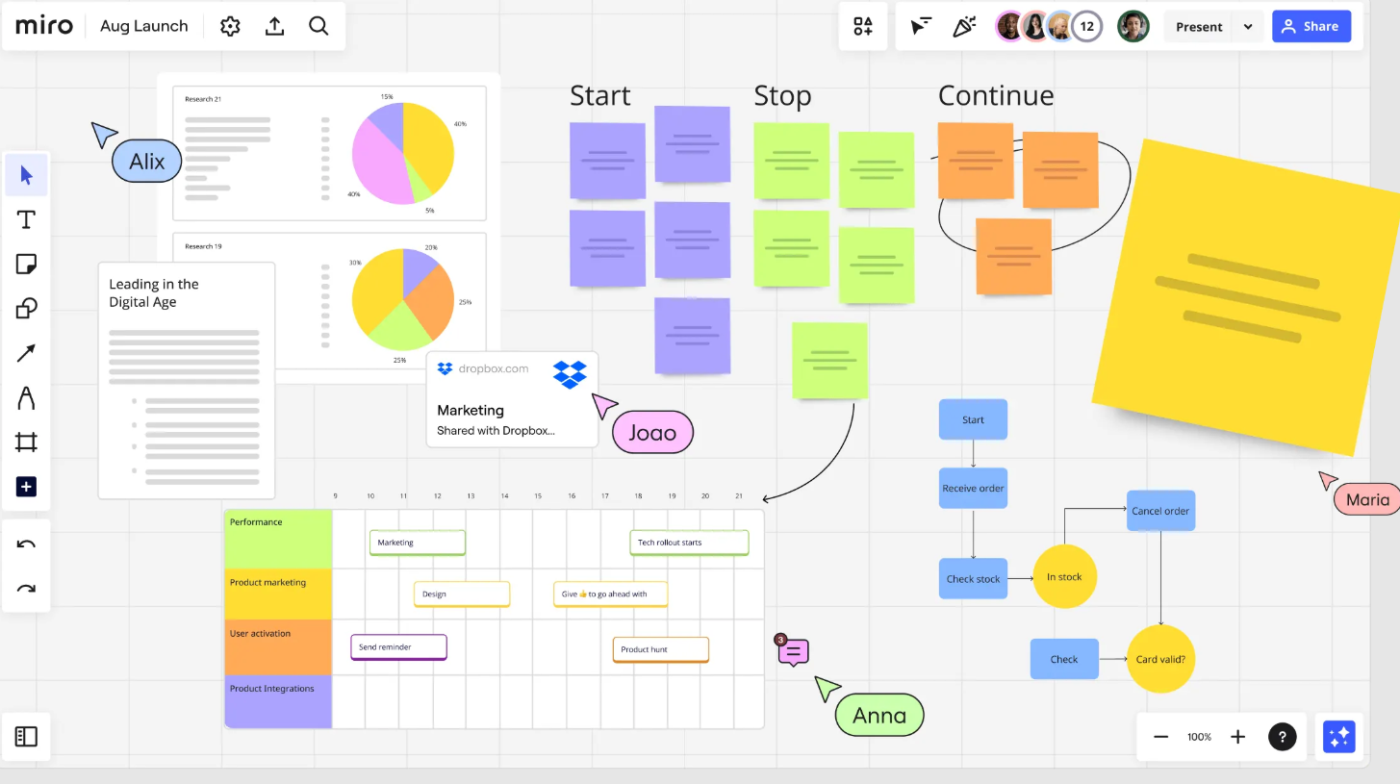
Miro is an interactive online whiteboard software with great mind mapping and brainstorming features. Customizable templates, 160+ integrations, and an intelligent canvas add flair to your physical classroom and momentum to meetings.
Miro’s Intelligent Canvas uses AI to turn your ideas into presentable outcomes, including product briefs, minutes, and summaries. Plus, make your brainstorming session more engaging with features like polls, dot voting, and estimates.
Looking for a whiteboard software that blends seamlessly with your Microsoft tools? Meet Microsoft Whiteboard—an excellent tool for teams, teachers, and the ultimate Microsoft collaboration hub.
It is essentially a virtual canvas for you and your team to brainstorm, sketch, and plan in real time. Its easy-to-use interface lets you spend more time creating and less time figuring out the tech.
For home:
For business:
Here’s what a G2 user has to say about Microsoft Whiteboard:
It has the tools I need for making charts for my marketing plans. It is also a cloud-based base by using MS 365, there is no need to download the application. I can save my file on the cloud as well.
➡️ Read more: Brainstorming Templates & Techniques
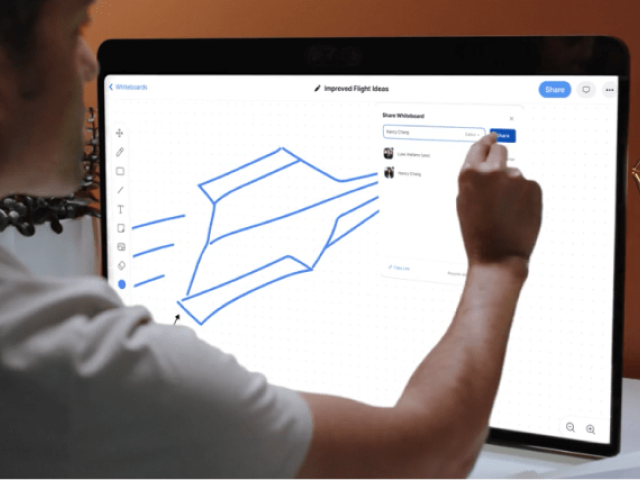
Zoom isn’t just for meetings; it also has a built-in whiteboard to help teams brainstorm, plan, and collaborate visually. The whiteboard is fully integrated with Zoom’s video conferencing, letting you ideate while staying connected with your team.
The whiteboard remains accessible after meetings, meaning you can revisit and refine your work whenever needed.
💡 Pro Tip: Looking for some brainstorming techniques? These seven proven brainstorming strategies make your brainstorming sessions more productive and enjoyable.
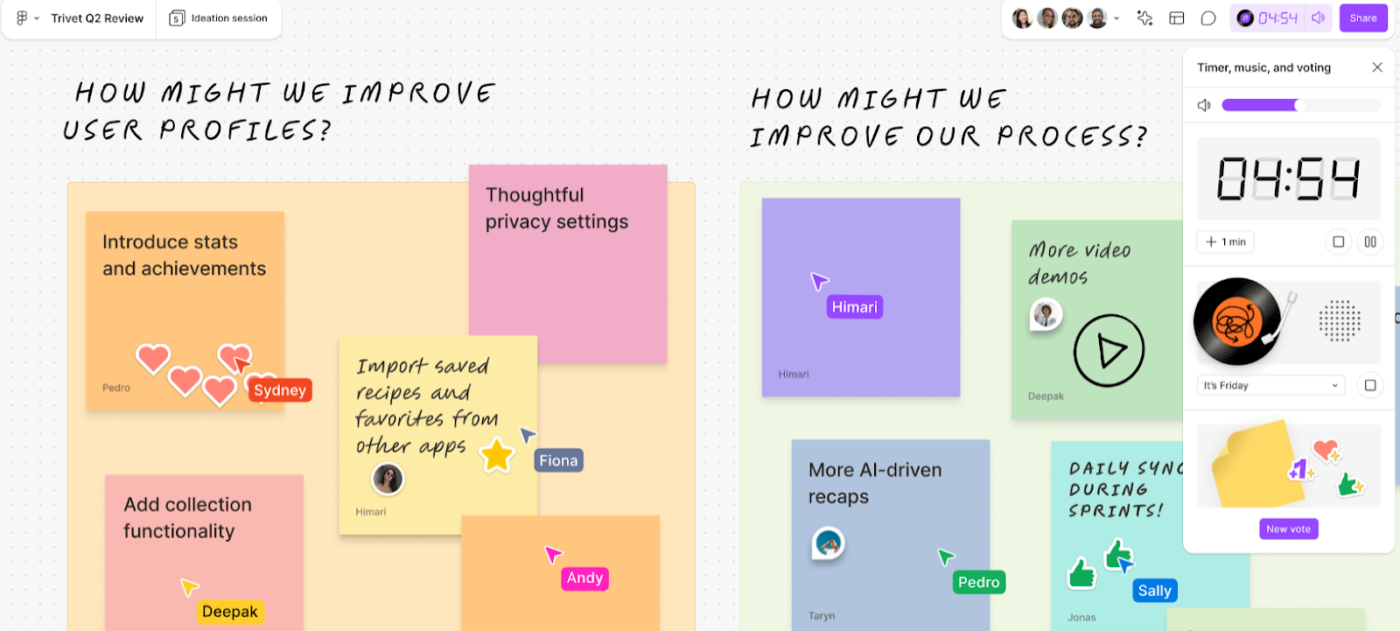
FigJam is an interactive online whiteboard with all the features educators, enterprise customers, and teams need, like drawing tools, sticky notes, and templates. It helps you quickly organize ideas and map out projects.
The best part? FigJam integrates smoothly with Figma, allowing design teams to brainstorm and refine ideas seamlessly. Plus, you can react to ideas on the canvas with stamps, high fives, and emojis or use audio and live chat to discuss things.
Find out why this G2 user finds Figjam delightful:
It has some great features like sections for sticky notes, lots of templates for common whiteboarding tasks, AI summaries of sticky notes, and then also lots of fun features too, such as the Polaroid widget and other interactive games and widgets.
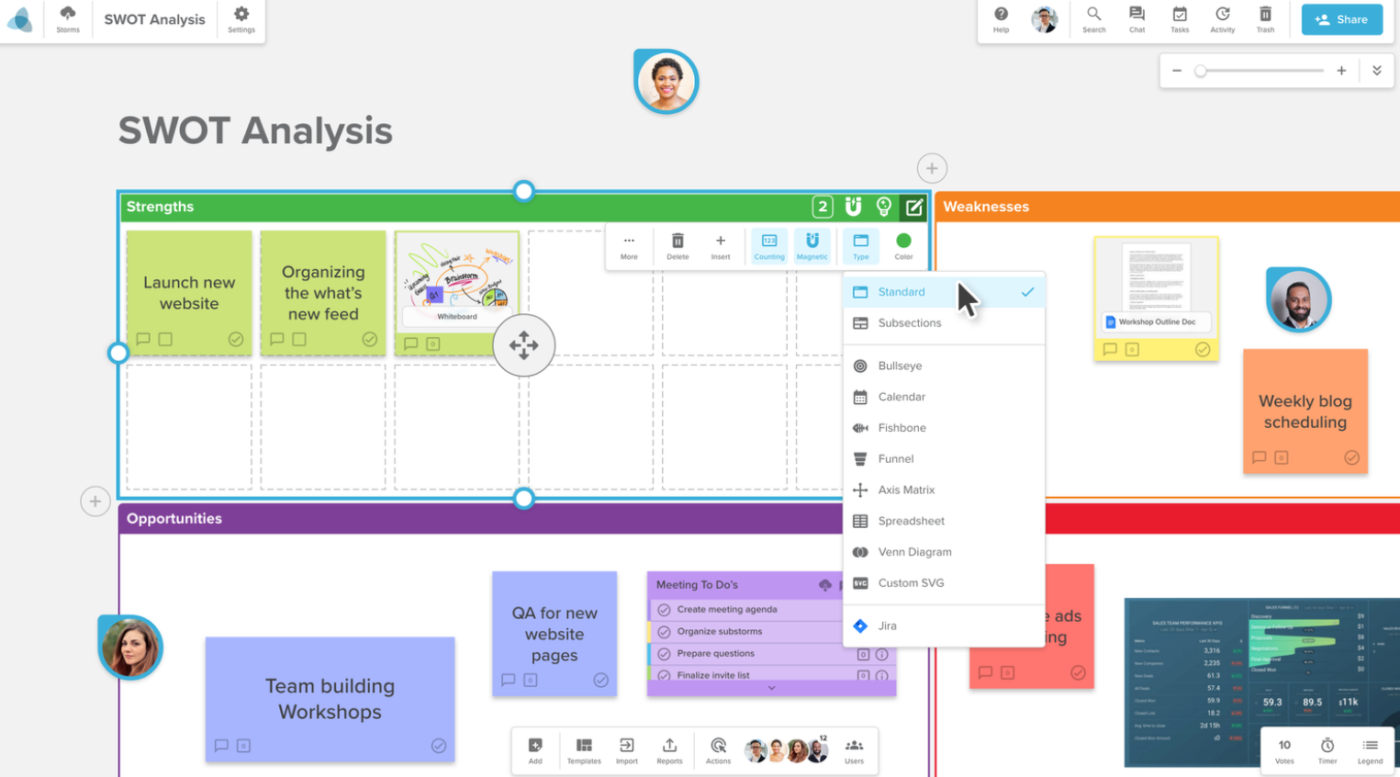
Stormboard is a collaborative whiteboard tool that stands out for its data-first approach.
It is great for teams working on agile programs and offers live bi-directional integrations with tools like Jira, Rally, and Azure DevOps. So, the changes made in Stormboard are reflected directly in your visual project management tools.
One of its standout features is StormAI, an AI-powered co-collaborator that enhances brainstorming, idea generation, and action planning.
Here’s why a G2 user loves using Stormboard:
With so many strengths, it is tough to pick just one. That said, being able to go from ‘Hey, we should storm on this!’ to having 100+ people adding ideas, images, and files into an outcome-driving page format in less than a minute is absolute gold.
📮 ClickUp Insight: According to research by ClickUp, about 33% of knowledge workers message one to three people daily to get the context they need. Use ClickUp Brain’s AI Knowledge Manager to reduce context switching and frustration. Ask the question right from your workspace, and ClickUp Brain will pull up the information from your workspace!
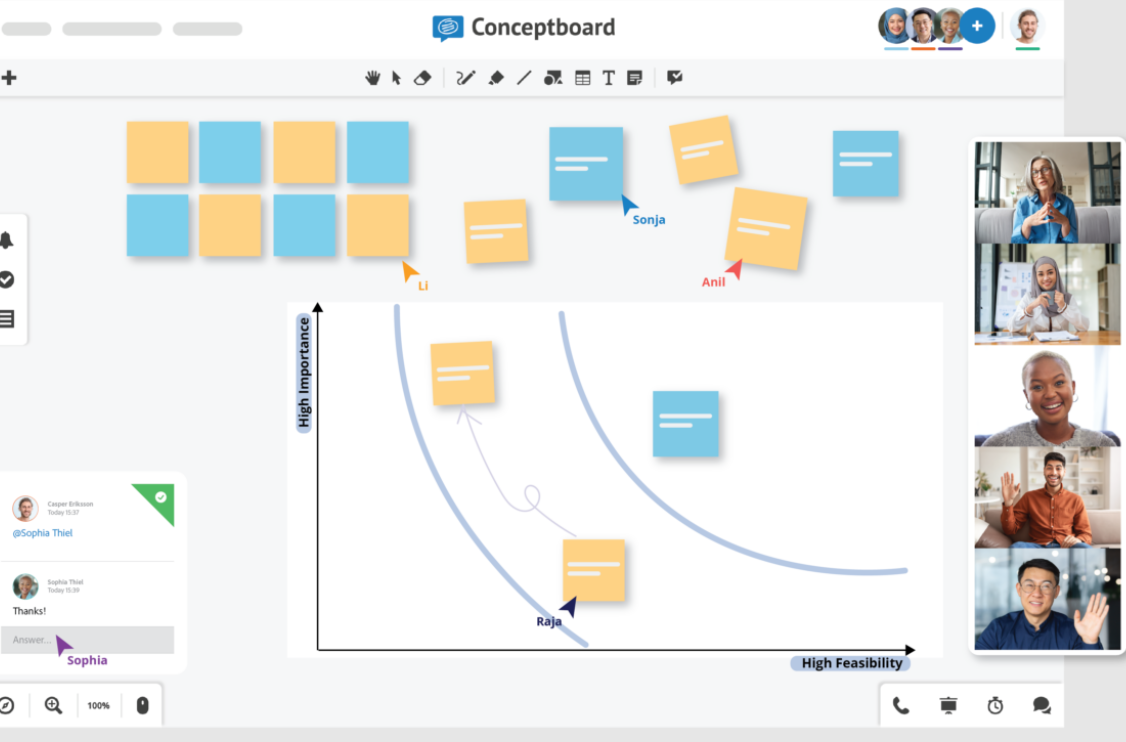
Conceptboard is built for teams needing a secure, structured way to collaborate, especially remote teams. The easily shared whiteboard is a real-time workspace where teams brainstorm, plan, and run workshops without missing a beat.
What makes it stand out? GDPR-compliant security, moderation controls for organized discussions, file import, role management, and some project management.
Whether you’re content brainstorming or running a design sprint, Conceptboard keeps everything structured and interactive.
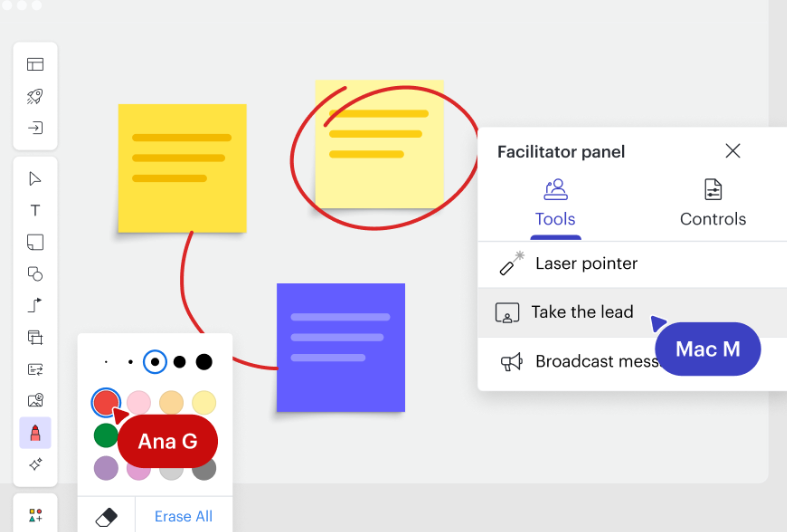
Lucidspark is where messy ideas turn into structured plans. Its infinity canvas is perfect for collecting ideas and organizing them neatly.
Every participant gets a live cursor with their name, so there’s no second-guessing who’s doing what. Need to focus? Breakout Boards let teams split work into sections and sync back later.
Running a workshop? Set a timer to keep things on track, and when it’s time to regroup, Call Others to Me instantly brings everyone to the same spot.
Here’s why Lucidspark is a go-to tool for brainstorming and mapping ideas for this G2 user:
I love how easy it is to create diagrams and map out workflows—especially for client projects where I need to see how all the pieces fit together. The real-time collaboration features are awesome, too. My team and clients can jump in, leave comments, and share ideas right on the board, which has made brainstorming sessions so much smoother.
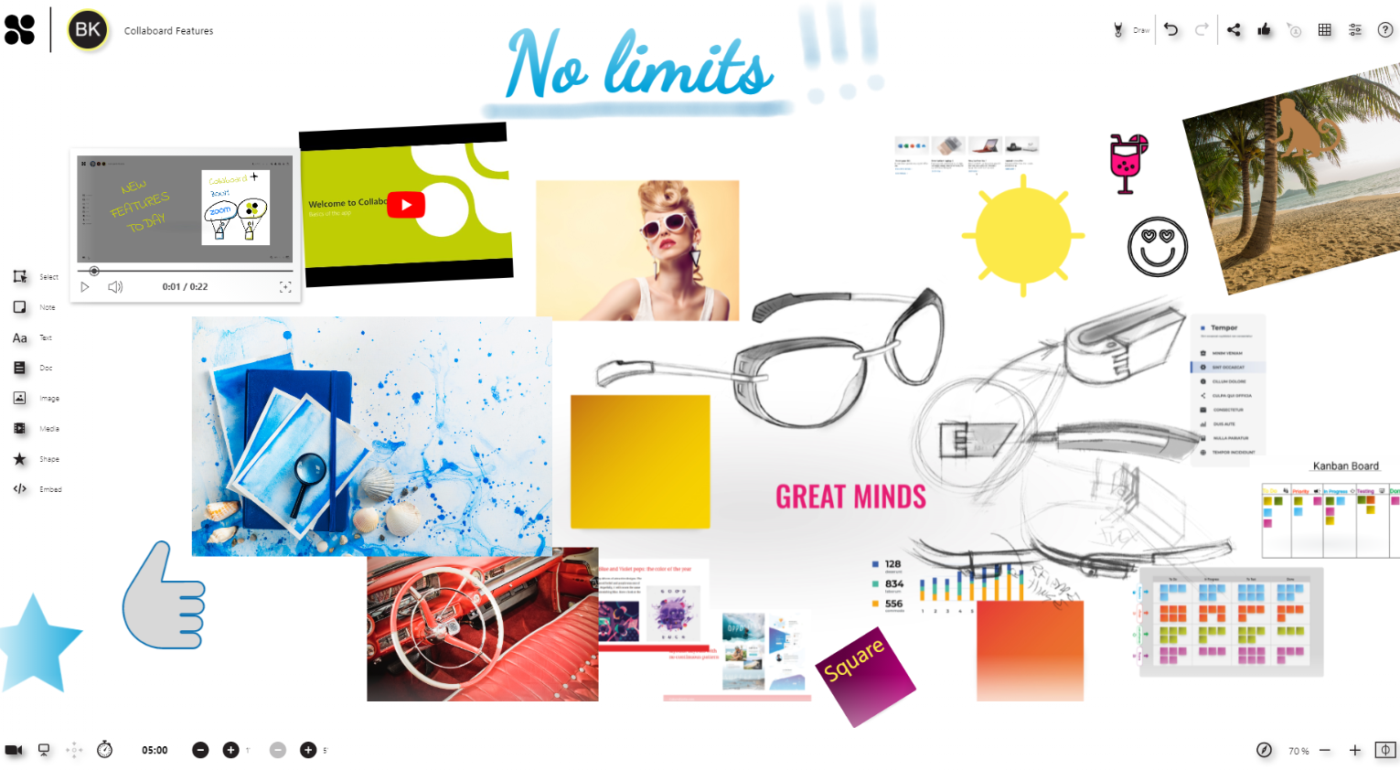
Collaboard brings a fun twist to online collaboration with its multimedia support, interactive tools, and security features. Whether you’re brainstorming with sticky notes, sketching ideas, or presenting in full-screen mode, it keeps things smooth and engaging.
Want to keep the team on track? Use its voting feature or set a timer to keep your meetings efficient. Plus, the digital version is perfect for teams that need a secure workspace—choose between cloud or on-premise hosting.
➡️ Read more: 14 Office Whiteboard Ideas for Work
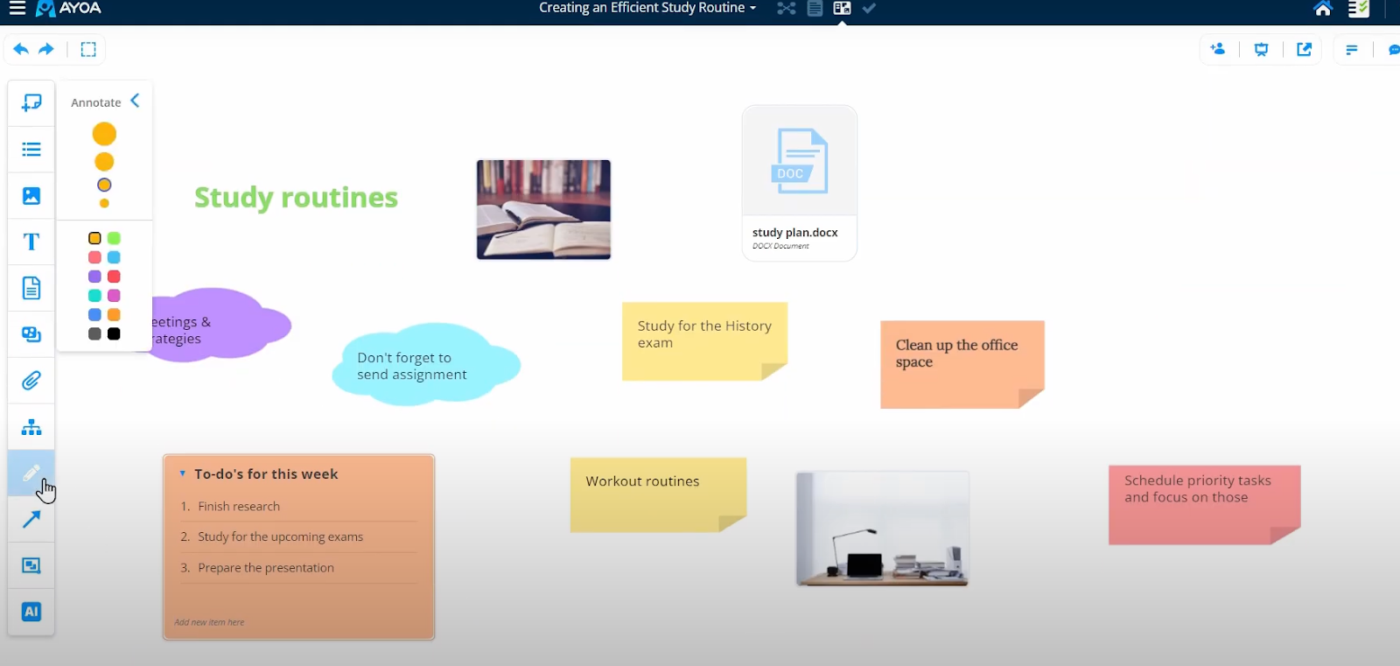
Ayoa is a versatile digital whiteboard that combines mind mapping, task management, and collaborative whiteboarding—all in one place.
What sets Ayoa apart is its task management integration. Once you’ve brainstormed ideas on the whiteboard, link them to your task boards and turn them into actionable steps, making project management smooth and organized.
Here’s why a G2 user loves Ayoa:
The whiteboards are handy when working with people who appreciate that style. Switching between views is invaluable, as is the ability to export or present immediately. No waiting.
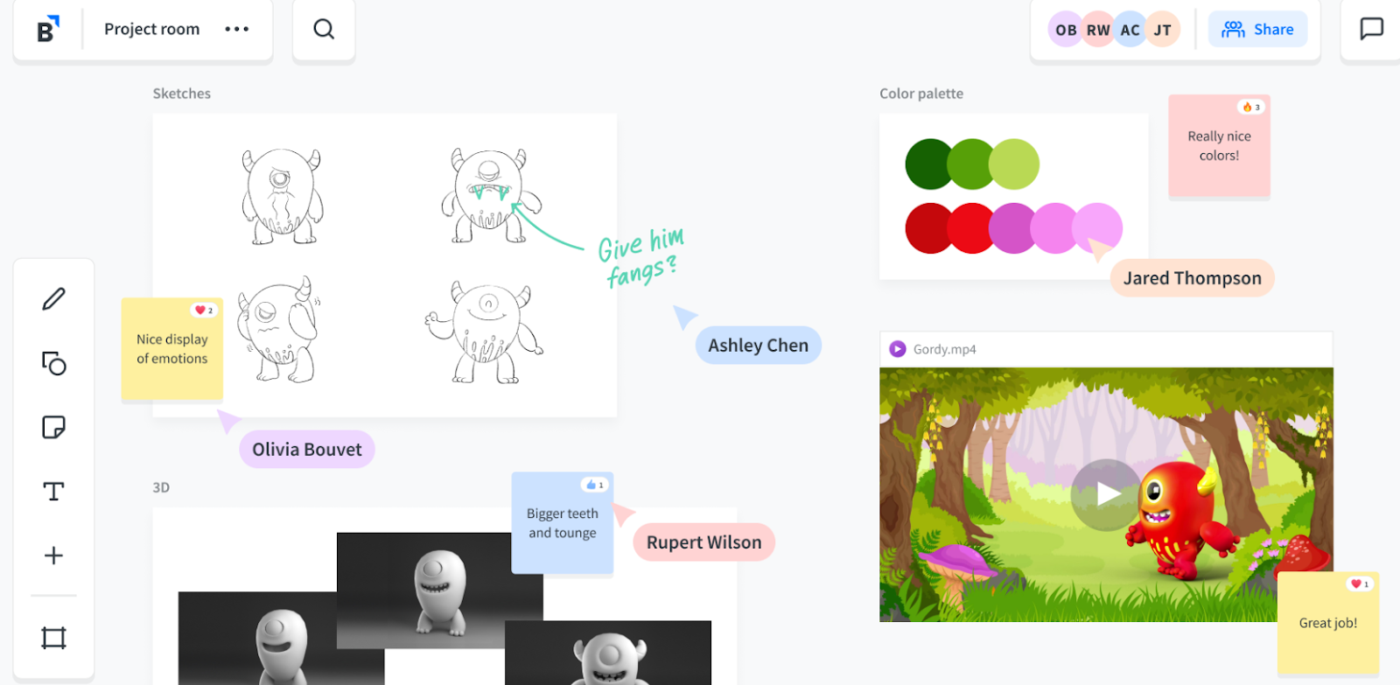
Bluescape is a secure, real-time digital whiteboard that brings teams together regardless of location. It’s great for brainstorming and organizing with its interactive whiteboards. You can write, sketch, and add content of all types—images, videos, PDFs, etc.
Plus, it integrates video calling, screen sharing, and real-time annotations to make communication and feedback smoother. And for teams handling sensitive info, it’s FedRAMP and DoD-approved, ensuring top-tier security. 🔐
This is what a G2 user has to say about Bluescape:
I love how Bluescape performs a very efficient function for us as a work team and also offers us tools, with conferences, chat, calls, and to be able to send documents or files to work live, that is, observe what each member of the team does.
Here are some other great whiteboard tools:
You might want to check out 👉🏽Mural vs. Microsoft Whiteboard: Which Whiteboard Tool Is Best?
The right whiteboard app makes all the difference in how your team collaborates, brainstorms, and brings ideas to life.
Whether you’re looking for seamless real-time collaboration, easy integration with other tools, or a secure space to manage sensitive information, there’s a solution that fits your needs.
If you’re ready to take your team collaboration to the next level, consider ClickUp!
This everything app for work brings it all together—whiteboards, task management, and workflow automation in one place.
Sign up for free today!
© 2026 ClickUp